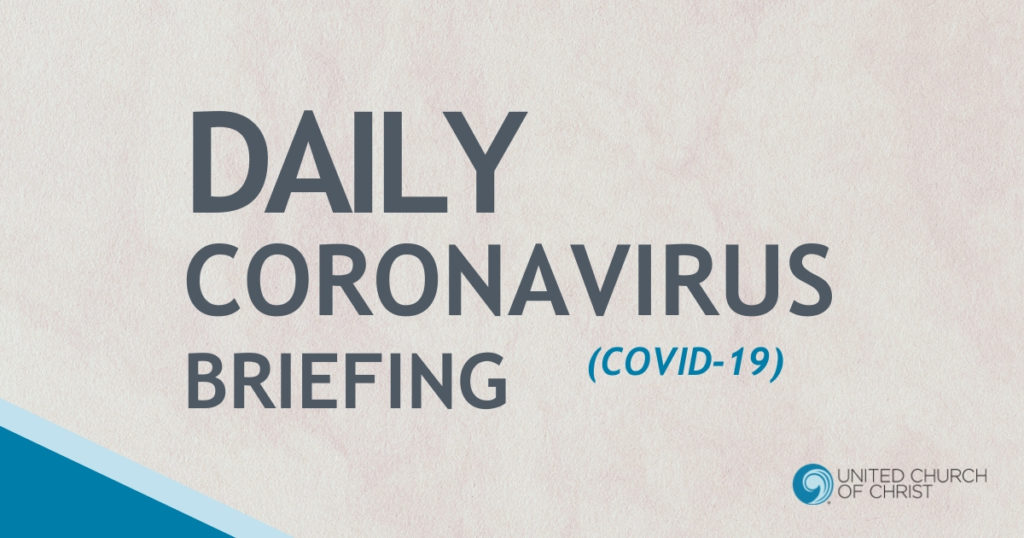Will COVID-19 Antibody Testing Get Us “Back to Normal?”
United Church of Christ – Wider Church Ministries
Humanitarian Development Team
Coronavirus (COVID-19) Daily Briefing
Barbara T. Baylor, MPH – Temporary Health Liaison
Will the COVID-19 antibody test get us “back to normal?”
“When will life get back to normal?” The question is on almost everyone’s minds these days. The answer, say many health experts, is greater testing capabilities to first determine who is infected and secondly to determine who has developed antibodies or immunities to the virus.
To reduce COVID-19 lockdown restrictions and stem further economic devastation from the pandemic, there is an increasing call for antibody testing to provide some peace of mind that it’s okay to return to work. Because it’s possible to be infected with COVID-19 and not know it (not everyone infected has symptoms), health officials are hopeful that antibody tests can give them a better idea of how widespread the new coronavirus’s reach really is.
Here are some basics about antibody tests: What are they? What do they do? How accurate are they?
According to the Centers for Disease Control, “An antibody (or “serology”) test looks for the presence of antibodies, which are specific proteins made in response to infections. Antibodies can be found in the blood of people who are tested after infection and show that people have had an immune response to the infection. Antibody test results are especially important for detecting previous infections with few or no symptoms.”
It takes the body about two to four weeks to develop IgM antibodies. A positive test result indicates that you have been exposed to COVID-19 and your body has developed antibodies. However it’s not clear whether someone who has COVID-19 antibodies in their blood is immune because scientists don’t know how long these antibodies might protect you against the coronavirus. More research is needed.
The U.S. Food and Drug Administration came under criticism for allowing hundreds of COVID-19 antibody tests on the U.S. market without prior review. This led to over 250 developers flooding the market with serological tests that may have been unreliable or inaccurate as well as those falsely claiming FDA authorization or the ability to be used at home.
The FDA now requires that these tests be authorized to remain on the market. To clamp down on false promotions, it has imposed new rigorous precision standards on commercial test companies. On May 4, the FDA announced that companies selling COVID-19 antibody tests must submit data proving accuracy within 10 days from the date of notifying the FDA for an authorization request or face removal from the market.
Through the Emergency Use Authorization (EUA) process, the FDA has now issued at least four EUAs for serological tests and this number is growing. The first is the test by Abbott, granted on April 26. To evaluate other antibody tests being marketed, the FDA has teamed up with the National Cancer Institute, the National Institute of Allergy and Infectious Diseases and the Centers for Disease Control and Prevention.
Consumers who want to make sure they’re getting good antibody tests should look for ones that have outside testing to confirm the test is accurate.
A postscript: The World Health Organization (WHO) has warned against “immunity passports.” Even if the tests were 100 percent accurate, we still don’t know whether antibodies to the new coronavirus will protect people from being re-infected. If they do confer protection, we don’t know whether it’s full or partial or how long it will last.
Do you want to take part in tests or treatment trials?
The National Institutes of Health (NIH) wants to study blood from 10,000 healthy people who haven’t tested positive for COVID-19. They want to see how many people might have had the virus without knowing it. If you want to take part, email the NIH at clinicalstudiesunit@nih.gov.
These tests may also help with an experimental treatment for COVID-19 called convalescent plasma. Plasma is the liquid part of your blood. Researchers are studying how antibodies in plasma donated by people who’ve recovered from COVID-19 might help those who are ill with the virus. One theory is that this plasma may help sick people get better faster. But more research is needed.
You can also volunteer to donate plasma through the National COVID-19 Convalescent Plasma Project. Or ask your local blood donation center for information.
References:
NPR: Antibody Tests for Coronavirus can miss the mark
FDA To Crack Down On Inaccurate Antibody Tests That Have Flooded the Market
Antibody Tests For Coronavirus Can Miss The Mark
About Our COVID-19 Antibody Test
Insight into FDA’s Revised Policy on Antibody Tests: Prioritizing Access and Accuracy
Related News
Planning for Earth Month: Resources for Congregations
April is Earth Month, and for congregations, it can be a great time to further discern how...
Read MoreBodily Autonomy Means Every-BODY
Advocacy and Action for Women's and Gender Justice Local events stir thoughts and...
Read MoreAn ally experiences PRIDE in the CLE
Advocacy and Action for Women's and Gender Justice Local events stir thoughts and...
Read More


